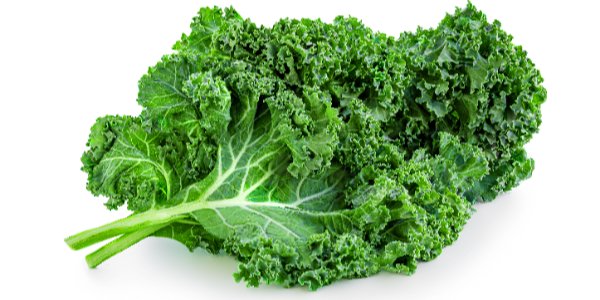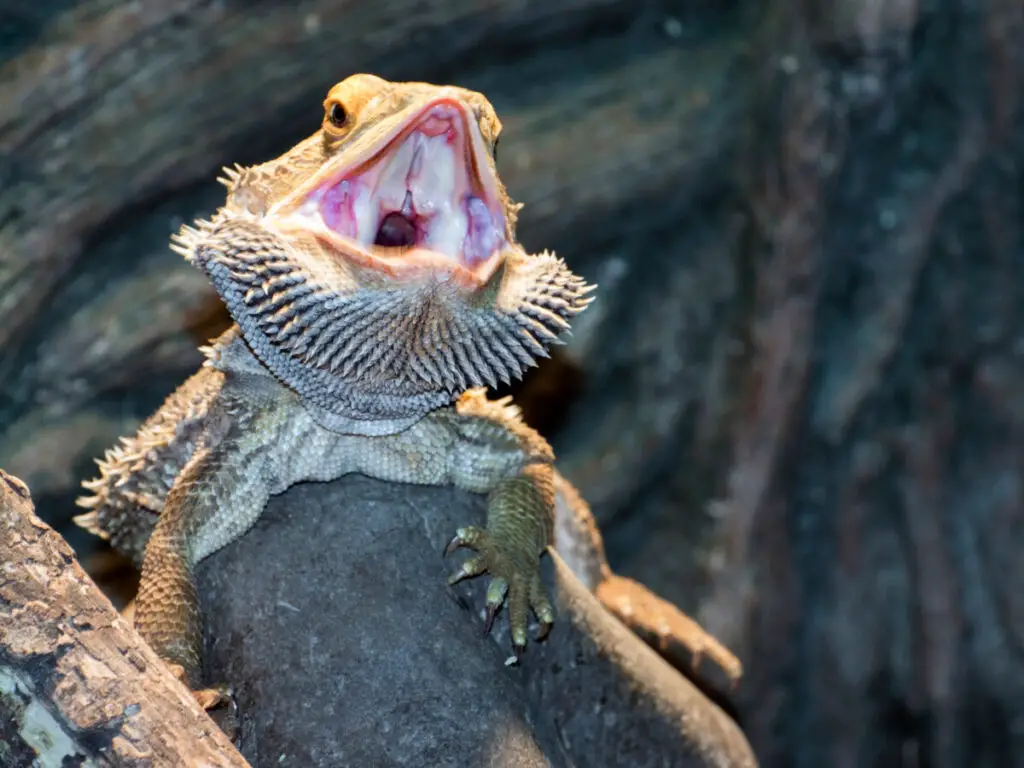Kale is known for being a superfood, and more and more people are incorporating it into their diets every day. It’s easy to see why; full of vitamins, minerals, and fiber, it’s an excellent choice for people. But can bearded dragons enjoy the leafy snack as well?
Bearded dragons can eat kale sparingly. Bearded dragons are omnivores who eat both plants and other animals. While a bearded dragon’s diet should contain lots of leafy greens, some of the minerals in kale are dangerous in large doses.
Kale provides healthy nutrients but also contains elements that can lead to illness or health problems for your bearded dragon. Read on to learn more about the health benefits and precautions of feeding kale to your bearded dragon.
Can Bearded Dragons Eat Kale as a Staple?
Bearded dragons cannot eat kale as a staple. Instead, an adult bearded dragon’s diet should be half protein-based and half plant-based. Alternate plants to use as staples include cabbage and broccoli.
When bearded dragons are young, they need lots of protein, and their diet should be 25% plant-based. In adulthood, plants should be 50% of your dragon’s diet. Most of these plants should be vegetables, although occasional fruit is also okay.
Bearded dragons can get their protein through small insects such as grasshoppers, worms, crickets, and slugs which are fed nutrients right before they are given to the dragon.
When it comes to plants, leafy greens should be used as a staple food. A few common choices are cabbage, broccoli, dandelion greens, and watercress. The doctors at VCA Animal Hospitals have compiled a list of acceptable vegetable staples for bearded dragons.

Is Kale Good for Bearded Dragons?
Kale is good for bearded dragons in small amounts, providing many essential vitamins and fiber. Kale greens should be raw and chopped finely before being fed to a bearded dragon.
It’s best if you serve kale to your bearded dragon raw. When you cook kale, it loses most of the nutrients that make it healthy.
Vitamin A
Some people worry about kale because it has too much Vitamin A, a nutrient that can be harmful to bearded dragons in large amounts. However, kale contains Vitamin A in the form of beta carotene, which your dragon turns into Vitamin A on its own. This means that your dragon will only absorb the Vitamin A they need and get rid of the rest, preventing Vitamin A poisoning.
Vitamin C
Vitamin C is crucial to connective tissue health in bearded dragons. Deficiency can lead to fragile skin and veins, which can cause slow healing and excessive bleeding. It is difficult for bearded dragons to become deficient in Vitamin C, as they can produce it themselves. However, kale is also a good source of Vitamin C.
Vitamin K
Like Vitamin C, Vitamin K is something that bearded dragons can produce themselves and therefore are rarely deficient in. Nevertheless, the additional vitamin K found in kale can help maintain a balance between calcium and phosphorus in reptiles.
Fiber
Fiber is an essential part of a healthy digestive system in omnivores and can also be used to produce energy. Fiber helps gut function by increasing the bulk of stools and helping to maintain healthy bacteria in the stomach. If necessary, animals can use fiber to create fatty acids, which are used for energy.
Kale is a good source of fiber. However, that can be said of all vegetables, especially leafy nutritious greens. If your bearded dragon’s diet consists of 50% plants, they are likely not deficient in fiber.
How Much Kale Can Bearded Dragons Eat?
Bearded dragons can eat a handful of kale once a week. Kale contains water and phosphorus, which are important parts of a bearded dragon’s diet but can also be harmful if your bearded dragon is eating kale in large amounts.
Water
Bearded dragons don’t require a lot of water and will not often drink out of a bowl of water. In the wild, they meet their hydration needs through dew and the water in plants. Kale contains a lot of water, so it’s a great way to keep your dragon hydrated. With that in mind, too much water can be harmful to your dragon.
Phosphorus
Bearded dragons need phosphorus to balance out the calcium in their diet. Ideally, the calcium to phosphorus ratio for the dragons is 2:1. Kale has 2.4 times the amount of phosphorus as calcium. So, kale is a good source of phosphorus, but you must make sure that your bearded dragon has a balanced and varied diet with a strong source of calcium in their diet to balance out its levels.
Why Is Kale Bad for Bearded Dragons?
Kale is bad for bearded dragons because, in large quantities, it can put your dragon at risk for several serious diseases. The presence of calcium oxalates and goitrogens in kale are not good for bearded dragons.
Calcium Oxalates
Calcium is an integral part of this pet’s diet. Although kale is a good source of calcium, it also has calcium oxalate, which inhibits calcium absorption.
This can lead to metabolic bone disease when it causes calcium deficiency. When the oxalates bind to calcium, it can also form kidney stones that can be problematic and painful.
Goitrogens
Like calcium oxalates, goitrogens inhibit the absorption of iodine, an important nutrient for thyroid health. Too much goitrogen in a bearded dragon’s system can lead to an underactive thyroid. Other vegetables that contain goitrogens are:
- Cabbage
- Mustard greens
- Swiss chard
- Spinach
- Lettuce
- Beet greens
Why Is Kale Bad for Reptiles?
Kale is bad for reptiles because it’s high in calcium oxalates and goitrogens that can cause health issues such as metabolic bone disease and hypothyroidism.
Metabolic Bone Disease
Metabolic bone disease is a chronic condition that presents as poor growth, bone fragility, and general weakness. Reptiles suffering from metabolic bone disease may also have less of an appetite, difficulty standing, limping, depression, and, in severe cases, seizures.
Metabolic bone disease is often caused by a lack of calcium, although a lack of Vitamin D3 can also contribute. Kale can prevent calcium absorption in reptiles and can lead directly to metabolic bone disease if consumed in large amounts.
Hypothyroidism
Like humans, the thyroid gland of bearded dragons is responsible for circulating necessary hormones around its body. Hypothyroidism occurs when the thyroid is not producing enough hormones.
Low thyroid levels cause goiter, or swelling of the thyroid, which is often visible as a distinct bulge in the bearded dragon’s throat. It also leads to fatigue and poor appetite. In reptiles, a lack of iodine is the primary cause of hypothyroidism. Excess amounts of kale can contribute to this iodine deficiency.
Can Bearded Dragons Eat Frozen Kale?
Yes, It is possible to feed fresh or frozen kale to your bearded dragons if you don’t have fresh kale available. But letting your bearded dragon eats fresh kale (raw kale) would be better as it has higher nutritional content.
Can Bearded Dragons Eat Cooked Kale?
Bearded dragons can eat cooked kale and won’t suffer any ill effects from eating it. However, it’s not going to benefit them very much! Heat depletes kale from its high nutritional value.

Final Thoughts
Kale has some nutritional value for bearded dragons and is acceptable to feed kale as a treat. A small amount once weekly is the maximum recommended portion. However, bearded dragons shouldn’t eat kale as a dietary staple food.
Beneficial nutrients like Vitamins A, C, and K and fiber, water, and phosphorus are all good for your bearded dragons in moderate amounts. However, these nutrients are also found in other leafy greens, some of which don’t have the drawbacks associated with kale.
Harmful elements in kale include calcium oxalates and goitrogens. All in all, balanced diet and moderation is the key when it comes to feeding kale to your bearded dragon.
Hope this post provided the needed information for feeding your bearded dragon kale as a bearded dragon owner.